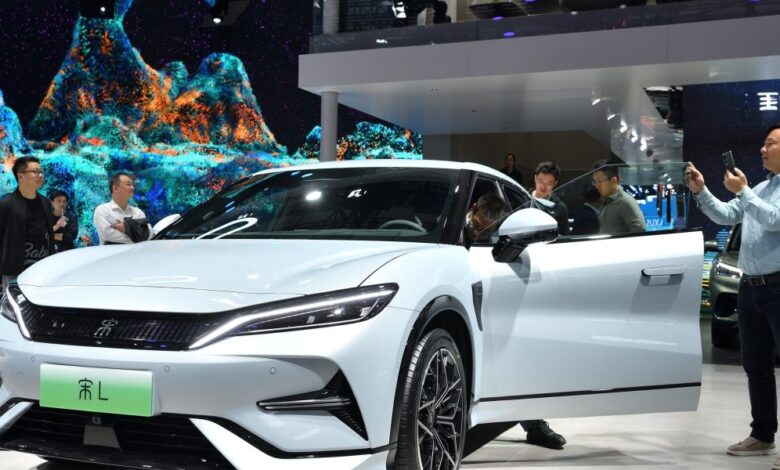
[ad_1]

BYD, an electric-vehicle maker in China that’s close to overtaking Tesla in global EV sales, shared a video earlier this year that sent shivers through the auto industry. The narrator urged China’s EV makers—all BYD rivals—to “demolish the old legends and achieve new world-class brands.”
It isn’t impossible. A key advantage for Chinese EV makers as they go global is their dominance in the supply chain, which helps them keep costs low. BYD, for instance, owns the supply chain of its EV batteries, from the raw materials to the finished battery packs. It also designs its own semiconductors.
That cost advantage has those “old legends” of the auto industry nervous—and racing for answers as China’s cars reach consumers in Europe, Southeast Asia, Australia, and elsewhere.
“What we hear from carmakers today is, ‘We don’t need longer range, we want lower costs,’’ Addionics CEO Moshiel Biton told Reuters. His startup makes it easier to produce high-performance batteries at a lower cost.
Bill Ford Jr., executive chairman of Ford Motor, warned about China’s EV makers earlier this year, saying, “They developed very quickly, and they’ve developed them in large scale, and now they are exporting.” U.S. automakers, he added, are “not quite yet ready” to compete against them.
In America, subsidies in the Inflation Reduction Act offer carmakers some protection from Chinese EVs. “But they will come here we think at some point and we need to be ready,” Ford said.
“We see the Chinese as the main competitor, not GM or Toyota,” Ford CEO Jim Farley said at a finance event in May, looking ahead to an EV future. “The Chinese are going to be the powerhouse.”
Indeed, 2023 is set to be the year that China overtakes Japan as the world’s top exporter of cars.
Not that it’s always gone smoothly. In Australia, an inexpensive EV sold by Great Wall China was recently recalled, with drivers warned that a charging flaw “will increase the risk of serious injury or death.”
But Tesla CEO Elon Musk has gone from laughing at the quality of BYD cars in 2011 to admitting they’re “highly competitive” earlier this year to saying “Chinese car companies are extremely competitive” at the recent New York Times Dealbook summit.
In Europe, inexpensive Chinese EVs have already arrived. BYD’s Dolphin hatchback starts at $33,000 in Britain, according to Reuters, or nearly 30% below the VW ID.3 hatchback’s starting price.
But even cheaper ones will arrive. Earlier this year in China, BYD launched an EV called the Seagull with a cutthroat price of about $11,000. It’s quickly become one of the best-selling EVs domestically. The Seagull and similar vehicles from China could prove to be a disruptive force in overseas markets.
“Automakers are really now only turning to affordable vehicles, knowing they’ve got to or they will lose out to Chinese manufacturers,” Andy Palmer, chairman of Brill Power, a UK company that boosts EV battery management system performance, told Reuters.
Tesla plans to build a 25,000-euro ($26,893) car at its factory near Berlin, Reuters reported last month. “We have to make our cars more affordable,” Musk said during an investor call in October.
At the Dealbook summit, Musk said, “China is super good at manufacturing, and the work ethic is incredible.” He even suggested that Chinese automakers might, as BYD put it, “demolish the old legends.”
“There’s a lot of people out there who think that the top 10 car companies are going to be Tesla followed by nine Chinese car companies,” he said. “I think they might not be wrong.”
[ad_2]
Source link




